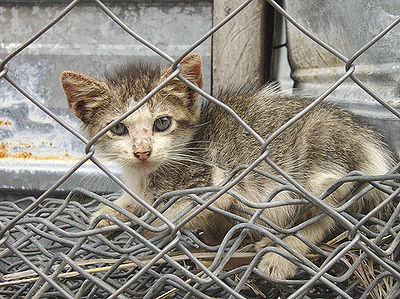Cats may often suffer the same ailments as dogs, but they are different creatures.
Your cat has different nutritional requirements. Many medications and flea/tick preparations that are prescribed for dogs can be lethal to cats.
Cats and dogs can both have allergies that make them itchy. A dog’s itchiness is usually traced back to a food allergy while a cat’s itchiness can have other causes.
Inflamed feet or paws can be caused by an autoimmune disorder called pemphigies foliaceur. Signs are crusty skin, pustules, mild ulceration and cracking and overgrown foodpads.
Ringworm is a contagious fungal skin infection that can affect skin, hair or nails. It appears as a round hairless sore on the skin which may have at its center, scaliness or small abscesses.
Feline acne (also known as chin acne) develops when hair follicles clog with oil resulting in blackheads. Blackheads can become red itchy lumps turning into pimples. The pimples can become abscessed, rupture and turn crusty. At this stage it is known as furunculosis. Severe chin acne causes swelling, draining, hair loss and can bemade worse by the cat’s scratching. If not treated, bacterial infections can develop.
When there is an excess of eosinophils (a type of white blood cells), Feline Eosinophilic Granuloma Complex develops. There are 3 types.
Eosinophilic plaque are raised round or ovdal sores that can be ulcerated. They are usually found on the abdomen or thighs.
Eosiniphilic granuloma is a mass or lumpy sore generally in the mouth, on the face or back of the thighs.
Indolent ulcer is an abscessed lesion most often seen on the upper lip.
Parasites such as fleas or mites sare a common cause of itchiness. Your cat may be very sensitive and allergic to these tiny creatures.
In order to treat your cat’s itchiness the cause must be identified. Your vet is the one to go to for a diagnosis. Then treatment can begin to heal wounds and remedy the itchiness.



